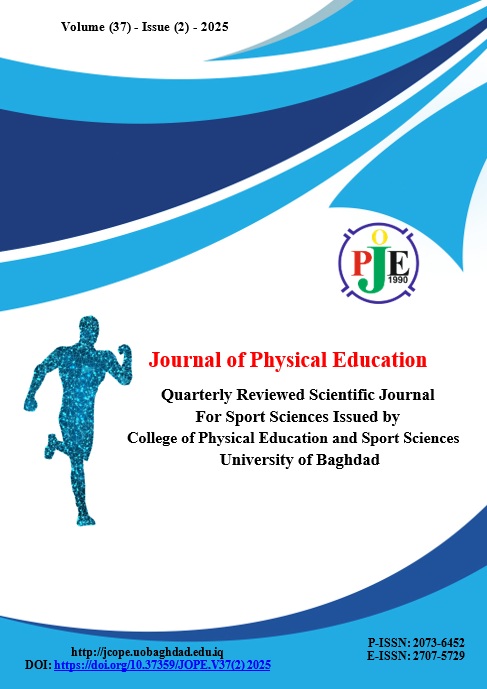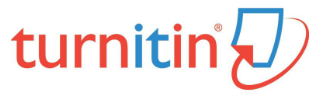The effect of the progressive inquiry model on creative thinking and learning to perform the smash and court defense skills in volleyball for students
DOI:
https://doi.org/10.37359/JOPE.V37(2)2025.2311Keywords:
Progressive inquiry model, Creative thinking, Volleyball skills, Student learningAbstract
The aim of the research was to prepare educational exercises and employ them using the progressive inquiry model to learn to perform the skills of smashing and defending the court in volleyball for students, and to identify the effect of the progressive inquiry model on creative thinking and learning to perform the skills of smashing and defending the court in volleyball for students. The experimental research method was adopted by designing two equal experimental and control groups with tight control in the pre- and post-tests. The limits of the community of this problem were represented by the fifth-grade preparatory students from the (1 June) Secondary School for Boys for the academic year (2024/2025), numbering (99) students, from whom (66) students were chosen for the research sample, representing (66.667%) of their original community. Then, students from the experimental group and the other control group were chosen from them in equal numbers. (20) students were chosen for the sample of the scientific foundations of the creative thinking test, representing (20.202%) of their original community. The remaining (13) students were also chosen for the exploratory experiment sample, representing (13%) of their original community. (13.131%) of their original community, and after determining the tests of the three dependent variables and completing the preparation of the educational exercises and employing them with the progressive inquiry model, the pre-tests were applied as a start to the research experiment, and then applying the vocabulary of the educational exercises with the progressive inquiry model in practical physical education lessons to the students of the experimental group, while the students of the control group apply the method followed as it is in their practical lessons, and completing this experiment by applying the post-tests, and processing the results by means of the (SPSS) system to be the conclusions and recommendations that preparing educational exercises with the progressive inquiry model in the educational units of practical volleyball lessons is suitable for fifth-grade middle school students, and that applying them in the educational units of practical volleyball lessons helps improve the level of creative thinking and helps in learning to perform the skills of smashing and defending the court in volleyball for students who learn with it, and with superiority over students who learn without it, and it is necessary when preparing educational exercises with the progressive inquiry model to give (2) minutes before performing each exercise from them to enable students to investigate and improve creative thinking in the educational units to learn skill performance With volleyball.
References
Abdul Hadi, Nabil, and Walid Ayyad, (2009). Strategies for Learning Thinking Skills. Amman. Wael Publishing House.
Abdul Nour, Kazem. (2005). Studies and Research in Psychology and the Education of Thinking and Creativity. Amman. De Bono for Printing, Publishing and Distribution.
Abdullah, Mahdi Iman. (2019). The effectiveness of a proposed unit in modern, renewable mathematics, invading logic, using post-structuralist models in developing achievement and attitudes towards mathematics among primary school students. Journal of Mathematics Education. Volume (22), Issue Part Three, January. 167-226.
Al-Ajrash, Haider Hatem. (2014). Contemporary Strategies and Methods in Teaching. Amman. Dar Al-Radwan.
Al-Bayati, Zainab Tariq Abdul Rahman. (2023). The effect of the accelerated learning method using optical technologies on reducing cognitive load, activating working memory, and teaching tennis skills to students. Master's thesis. University of Baghdad. College of Physical Education and Sports Sciences.
Al-Harthi, Hamoud. (2006). Strategies for Teaching Thinking. Amman. Al-Majdalawi Publishing House.
Al-Jabouri, Muhammad Jawad (2012). Teaching Thinking: A Strategic Vision for Renewal and Creativity. Lebanon. Dar Al-Ta'aruf Printing House.
Al-Karkhi, Majeed. (2014). Program Planning and Evaluation. Amman. Dar Al-Manahj for Publishing and Distribution.
Al-Naoushi, Qasim Saleh. (2019). Learning and Teaching in the Twenty-First Century. Amman. Dar Al-Masirah for Printing and Publishing.
Al-Samarrai, Asmaa Hikmat Fadhel. (2002). Constructing and standardizing a scale of scientific knowledge and its relationship to skill performance in volleyball. PhD thesis. University of Baghdad. College of Physical Education and Sports Sciences.
Al-Tayti, Muhammad Hamad. (2019). Developing Creative Thinking Capabilities. Ed. (9). Amman. Dar Al-Masirah for Publishing and Distribution.
Brooker, R., & Butterworth, I. (2019). Cooperative Learning in Physical Education and Physical Activity: A practical introduction.
Carmen F., Mercedes F., Gloria S., Marta S. & Dolores M. (2017). Divergent thinking and its dimensions: what we talk about and what we evaluate? Anales de Psicologia; 33 (1), P: 40 - 47.
Harvey, S., Pill, S., & Almond, L. (2019). Knowledge management and sport coaching. In Routledge International Handbook of Sport and Exercise Psychology (P: 484-496).
Hassanein, Mohamed Sobhi and Abdel Moneim, Hamdi. (2004). Scientific foundations of volleyball and methods of measurement and evaluation. Ed. (3). Cairo. Book Center for Publishing.
Kariman Muhammad Badir. (2012). Active Learning. 2nd ed. Amman. Dar Al Masirah for Publishing and Distribution.
Mahdi, Iman Abdullah. (2019). The effectiveness of a proposed unit in modern, innovative mathematics, Fuzzy Logical, using post-structuralist models, in developing achievement and attitudes towards mathematics among primary school students. Journal of Mathematics Education. The Egyptian Society for Mathematics Education. 22 (3). 167-226.
Matnash, Hussam Hussein. (2020). Using the IDGA model and its impact on mental imagery, cognitive achievement, and crushing volleyball performance of students of the College of Physical Education and Sports Sciences, Al-Qadisiyah University. Journal of Sports Education Studies and Research, Issue 64.
Moayd, A., Moayad, G., & Jewad, M. (2019). The Effect of Group Investigation Model on Learning overhead and underarm Pass in Volleyball. Journal of Physical Education, 31(2).
Mohamed, Hassan Maha Ali. (2021). The Progressive Inquiry Model and the Development of Creative Problem Solving in Mathematics and Higher-Order Thinking among Secondary School Students. Journal of Mathematics Education, Egyptian Society for Mathematics Education. Volume 24, Issue 3, January.
Mustafa, Muhammad Najib. (2019). Scientific Investigation, 3rd ed. Riyadh. Al-Rashid Library.
Mustafa, Rehab Mohamed Al-Abd. (2024). The effectiveness of using a model of differentiative learning and progressive inquiry in developing literary text analysis skills and its impact on critical listening among middle school students. Ain Shams University. Journal of the Faculty of Education. Volume (48). Part (4). Issue (67).
Muukkonen, H., Lakkala, M., &Hakkarainen, K. (2019). Technology- Mediation and Tutoring: How Do They Shape Progressive Inquiry Discourse? Journal of the Learning Science, 14. (4). 527-565. http://doi.org / 10.1207/815327809jls14043
Omar, Hesham Ramadan, and Ahmed, Ghanem Ahmed, (2021). The Effectiveness of Using Cognitive Load Theory in Developing Levels of Cognitive Depth and Reducing Psychological Stress among Low-Achieving French Language Students, Journal of the Faculty of Education, Al-Azhar University, Issue (191), Part (3).
Schunk, Dale H.(2012). Learning Theories An Educational Perspective Boston.
Downloads
Published
Issue
Section
License
Copyright (c) 2025 Journal of Physical Education

This work is licensed under a Creative Commons Attribution-NonCommercial 4.0 International License.






 The Journal of Physical Education (JOPE) applies a Creative Commons Attribution 4.0 International license (CC BY 4.0), which lets others distribute, remix, tweak, and build upon your work, even commercially, as long as they credit you for the original creation. For more information, click the link :
The Journal of Physical Education (JOPE) applies a Creative Commons Attribution 4.0 International license (CC BY 4.0), which lets others distribute, remix, tweak, and build upon your work, even commercially, as long as they credit you for the original creation. For more information, click the link : 